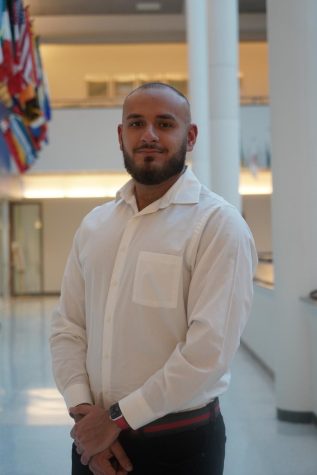CUNY professor and alumna help Afghan family flee Taliban rule
October 29, 2021
Macaulay Honors College lecturer and former Baruch College professor Zohra Saed and Mayha Ghouri, an immigration lawyer who was a former student of Saed’s, are working together to help an Afghan writer and his family escape the Taliban.
Saed asked that the writer and his family not be identified for safety reasons.
“In Afghanistan, a lot of people risked their lives to create things like education and gender
equity and now they’ve been abandoned,” Saed said, according to a CUNY post.
This effort comes on the heels of U.S. withdrawal from Afghanistan, effectively ending the 20- year “war on terror” and resulting in the Taliban, the group governing the country from 1996 to 2001 that is accused of human rights abuses, to return to power.
Saed first met the writer three years ago, when they collaborated on a project to preserve and publish lyrical folk poems in the Uzbek language. Saed and the writer, along with his family, are of Uzbek descent.
However, the Taliban has long targeted ethnic Uzbeks in Afghanistan. Thousands of members of the minority group were killed by the Taliban in the 1998 massacre of Mazar-i-Sharif, and many aided the United States during the war in Afghanistan.
The ancestors of Saed’s parents were refugees from Uzbekistan. Saed and her family moved from Afghanistan to Saudi Arabia during the Soviet-Afghan War in the 1980s, when Saed was just a year old.
The family moved to Brooklyn when she was five years old. Saed eventually attended Brooklyn College and the CUNY Graduate Center.
Now, reminded by her family’s story, Saed said she feels an obligation to help the writer and his family escape, as well.
“That’s probably why I felt responsible for his family,” Saed said, as reported by The New York Times. “For me, it touched a chord.”
In addition to being an ethnic minority, the writer and his family are targets because he was a local youth sports coordinator who included girls in his program, which goes against Taliban customs. His family also participated in activities against the Taliban.
“He protected the girls, so the Taliban was chasing him and he had to go into hiding with his family,” Saed said. “His sister was a girls high school principal who trained women in rural areas for teacher certifications. And their father is a theologian and an artist who spoke against the Taliban.”
Saed contacted Ghouri in August after learning that the writer’s sister unsuccessfully tried to escape Afghanistan at the Kabul airport in the U.S. evacuation at the airport over the summer.
Ghouri was a student of Saed’s when she attended Hunter College and took Saed’s class on Arab American literature. After completing her undergraduate education at Hunter, Ghouri graduated from the CUNY School of Law and became a lawyer for Neighbors Link, a Westchester-based non-profit providing services to immigrants.
Saed and Ghouri have thus far been able to help the writer and his family apply for visas. They also helped the family raise roughly $7,000 to pay for their application, travel and relocation fees. Application processing fees cost $575 per person.
CUNY Chancellor Félix Matos Rodríguez expressed his support for Saed and Ghouri, praising their “selflessness and compassion.”
“The plight of this family and tens of thousands of Afghans who are in danger and seeking refuge in the United States touches so many of us at CUNY,” Matos Rodríguez said. “I applaud Zohra Saed and Mayha Ghouri for their selflessness and compassion and hope that their efforts bring the family to safety and a new life of dignity, equality and opportunity in the United States.”
However, Ghouri warned Saed that it would be a difficult and uncertain process. Approvals could take months to process, if they are even granted at all.
Additionally, the number of Afghans permitted to resettle in the United States this fall is 65,000, leading to thousands of Afghans competing for the same slots.
If the writer and his family are approved, they would have to cross into a neighboring country to pick up visas at an American embassy or consulate. They then would have to arrange flights to the United States and face further screening before applying for asylum.
“It’s a ton of risk,” Ghouri told The New York Times.
Despite the risk and uncertainty, the pair, with the help of Neighbors Link, has persisted. Saed has set up a GoFundMe page to raise an additional $32,000 to support the family’s expenses.
“This is a family of literary, artistic and educational activists who did a lot of work, showed a lot of courage and protected a lot of lives in Afghanistan, and now it’s time to protect them,” Saed said. “They need our help to come to a place where they can breathe easy, where they can live with respect and dignity.”


![[Afghanistan] - Credit_](https://theticker.org/wp-content/uploads/2021/10/Afghanistan-Credit_-CUNY-900x900.jpeg)





